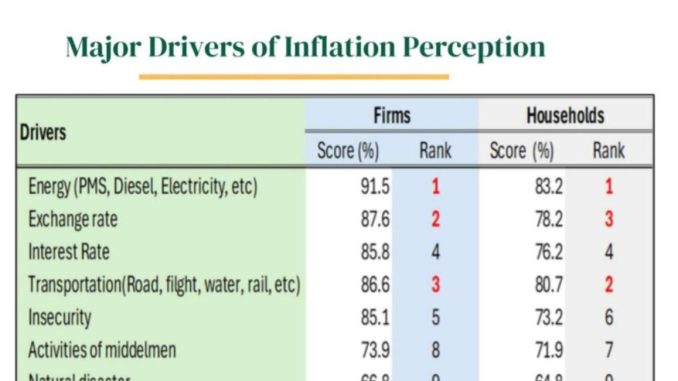
This development is contained in the Central Bank of Nigeria’s Inflation Perception Survey Report for July.
A Central Bank of Nigeria (CBN) report has stated that Nigerians have identified the price of petroleum, insecurity and electricity as major drivers of inflation in the country.

This development is contained in the Central Bank of Nigeria’s Inflation Perception Survey Report for July.
According to the report, energy — consisting of PMS (fuel), diesel, and electricity — topped the drivers of inflation at 91.5% for firms and 83.2% for households.
The exchange rate was also identified as a major driver of inflation with an 87.6% score for firms and 78.2% for households.
Other major drivers listed were transportation (road, rail, water, and flight), which recorded an 86.6% score for firms and 80.7% for households.
Insecurity stood at 85.1% for firms and 73.2% for households, while interest rates recorded 85.8% for firms and 76.2% for households.
Nigerians have continued to lament inflation, which has worsened the cost of living in the country.
As of the time of this report, the dollar exchanges at over ₦1,500.
SaharaReporters previously reported that kidnappers across Nigeria demanded a total of ₦48 billion in ransom between July 2024 and June 2025. This is according to data provided by SB Morgen.
It was noted that kidnappers have grown increasingly audacious this year, demanding staggering sums for ransom. Of the ₦48,009,590,000 total sought, the highest ransom stemmed from the March 15, 2025, abduction of Chidimma and Precious Enuma, along with their aunt, Anwuri Oko Ye, in Ebedei Ukwuole community, Ukwuani Local Government Area, Delta State.
Meanwhile, the 2025 data paints an alarming macroeconomic picture: “while ransom payments in naira reach record highs (₦2.56 billion paid against ₦48 billion demanded), their dwindling dollar value (just $1.66 million) exposes an industry cannibalising itself,” the report said.
Nigerians have also lamented poor electricity availability in the country.
Data from the Nigerian Electricity Regulatory Commission (NERC) shows that 53% of Nigerians still lack access to electricity meters, despite repeated promises by the government to bridge the metering gap.
In January 2023, while campaigning in Ondo State, President Bola Tinubu said he would abolish estimated electricity billing if elected president in February 2024.
However, as of the end of the first quarter of 2025, NERC data indicates that only 46.98% of Nigerian electricity consumers had access to meters, while 53.02% remained unmetered.
Further analysis shows that out of 13.7 million registered electricity customers in Nigeria as of Q1 2025, only 6.4 million were metered.
This situation persists amid widespread complaints by Nigerians over the high cost of electricity caused by estimated billing.
Leave a Reply